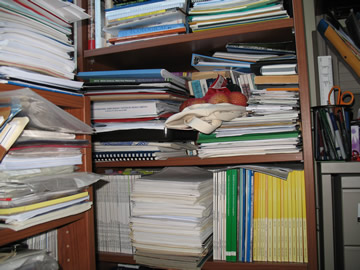
Anticipating the big push that starts today for faculty and staff in Hardin Hall to recycle, SNR faculty members weighed the pros and cons of recycling journal collections that have more symbolic than informational value in the digital era.
“It’s not the last 10 years, it’s 1940 to 1980, that 400 pounds of the journal,” said Dave Wedin, School of Natural Resource ecologist. “The digital tools available are so powerful that I rarely open the journals. Some of them you’ll never find online but a lot of it you will. It’s that security blanket effect of being surrounded by paper copies of your knowledge. There’s this fear that the knowledge will be lost. What is the role of old journals?”
Recognizing that the space could probably be used more productively, Wedin said his first thought was to donate the journals to another institution. He consulted with Larkin Powell, a fellow ecologist who spent a year on sabbatical in Namibia and is now interim associate dean for the Agricultural Research Division. “It is possible that they could be useful somewhere,” Powell said. “But my experience at Polytechnic in Namibia was that they had good access to electronic versions of journals … and sometimes even better access than UNL (on a couple types of journals) because some organizations provide free access to developing countries' libraries. I have a bunch as well, and have just about decided that recycling may be the best option.”
Matt Joeckel, SNR geologist, advocated holding on to paper and ink to be on the safe side. “We trust our electronic media too much, and our systems are more fragile than we think,” he said. “It's easier to grab a book from a burning building and run with it than it is to foil a complete wipeout of electronic publications. What's to say that we can't have the electronic equivalent of burning the library at Alexandria? I still think that we need to have some things on paper, somewhere.” Joeckel noted that he doesn't actually keep journals himself, but relies on libraries to keep paper archives.
Others have already committed to scholarship in a digital era. Steve Thomas, stream ecologist, said, “I don't receive or use paper journals anymore and haven't for some time. Current library subscriptions and search engines are making this an easier and easier approach. Combine that with inter-university agreements to share library resources and it's rare that you ever need the paper journal.”
Amy Burgin, an interdisciplinary aquatic ecologist and limnologist who joined SNR in 2011, said, "My move to UNL was good motivation to transfer my entire reprint collection into a digital format. I now have less than a file drawer of printed papers. I use a free program called Mendeley to organize and search all of my files. The beautiful thing about Mendeley is that it will extract bibliographic information from pdfs -- no manual entry. It also organizes the files by author, which makes finding papers easy. The data extraction feature doesn't work as well for scanned copies of papers, but works beautifully if you download the same paper from a journal's website. Given that even back issues of journals are online, I don't think I'll ever subscribe to a paper journal again."
John Quinn, a post-doc at SNR who will begin a tenure-track job in August at Furman University, said, “I subscribed to journals for about two years, and then I realized that 80 percent of what was in there, I wasn’t going to read. And being a grad student and now a post-doc, you move. Now I’ve got a token two shelves of matched journals from the mid-2000s. It looks nice but for me it’s not practical at all.”
Back when he was paper-based, Quinn said, “I’d go home for Christmas and I’d bring two stacks of books or 30 journal articles, and I didn’t read them because it’s Christmas. Now I just bring my kindle and I still don’t read them but at least I don’t break my back.”
Quinn, who describes himself as an early adopter of new technologies, strongly recommends free software such as Evernote, Dropbox and Mendeley that let researchers sync and share documents and notes across laptops, tablets, phones and other devices. (You may need to request assistance from the SNR IT staff to install programs on machines in Hardin Hall.) One of his operating principles is that “If it doesn’t sync, it’s not worthwhile.”
Quinn also only uses software that is actually time-saving. “If I spend more time, I end up reverting back to what I did before,” he said. In addition to note-taking programs that sync across devices, Quinn jots brief reminders to himself in a field notebook that he has carried for five years.
Look for extra recycling totes throughout Hardin Hall the week of March 12. Our spring cleaning, a week ahead of the rest of the university, is a chance to stand out and to lead by example, and contributes to UNL’s success in the RecycleMania competition.